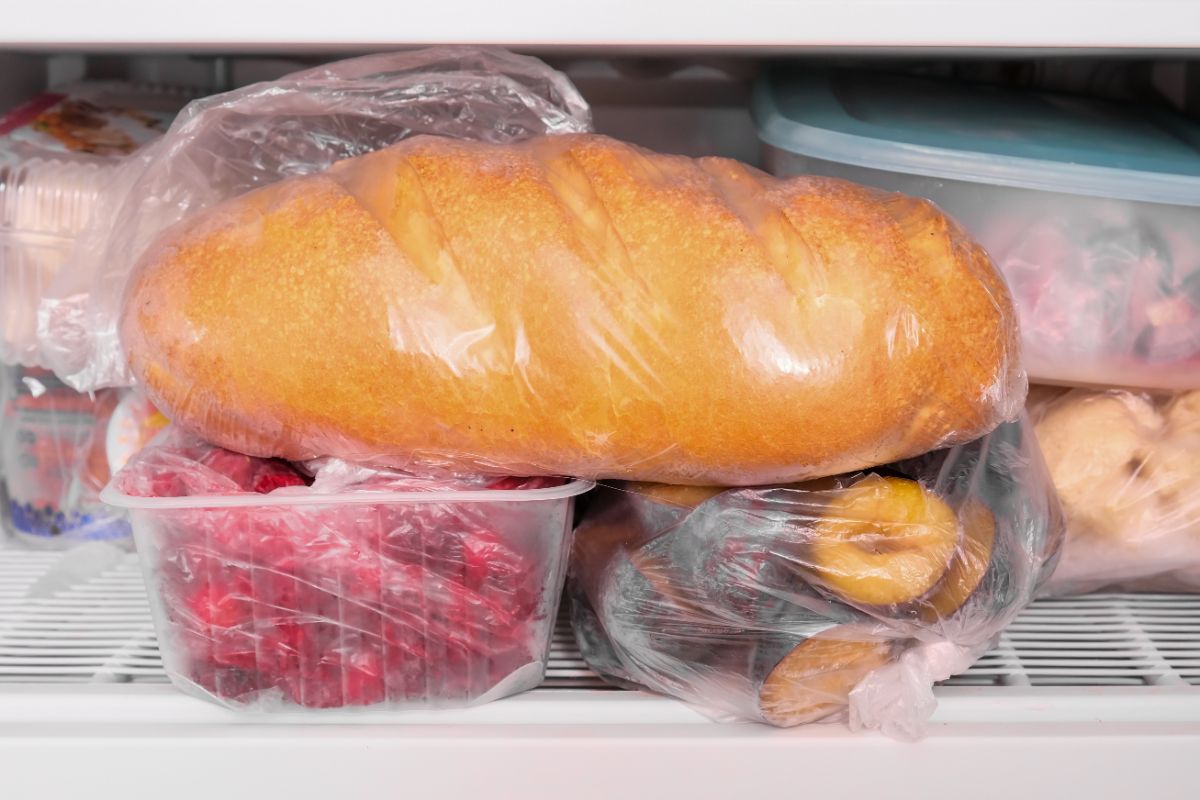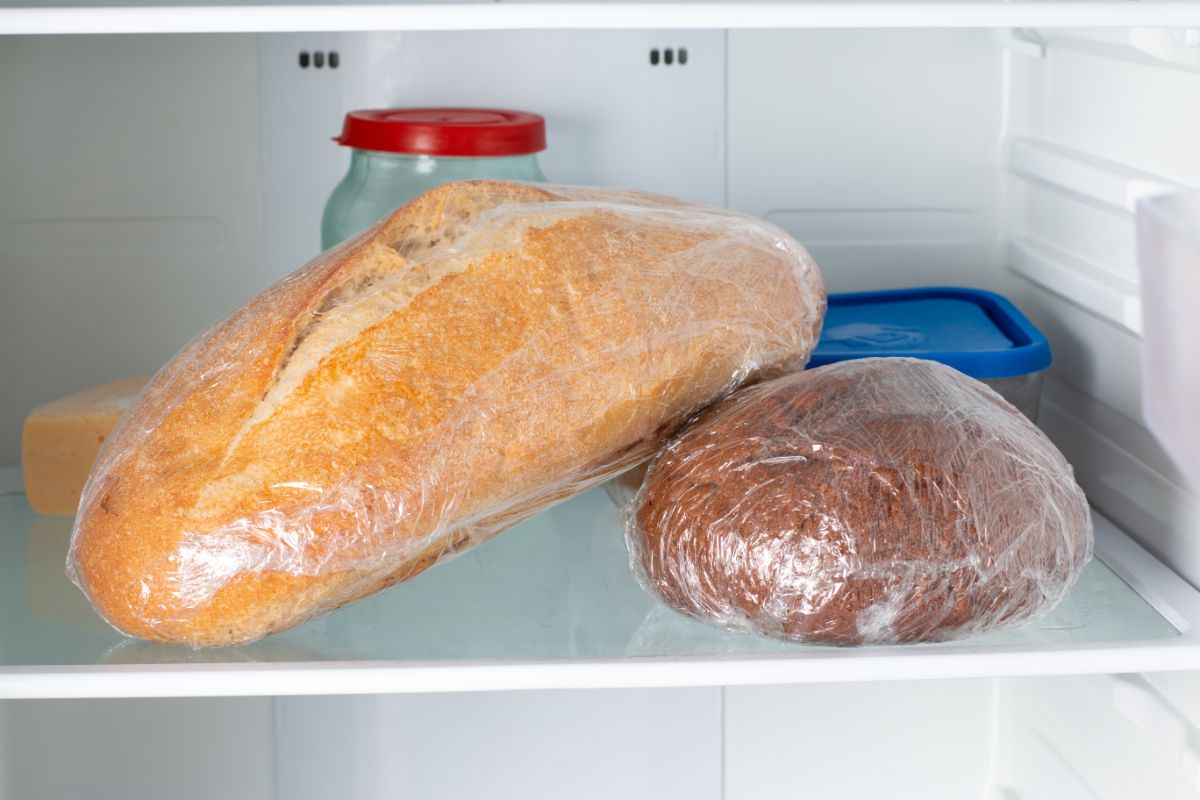
Technically, you can freeze it at any time, including as it is going bad. Let’s address some of the related issues surrounding freezing bread so that it lasts as long as possible.
So, can I freeze bread before it expires? Yes, you can. However, this stops the clock so to speak. If the bread would only be good for a day or so when you froze it, it will only be good for a day or so when you thaw it. And that continued breakdown of the bread occurs while it is thawing.
This means sourdough bread that is good for another 2 to 3 days when frozen will only last two to three more days after you thaw it.
To maximize the life of the bread, freeze it once you get it or after you’ve finished most of your freshly baked loaf and decided you want to preserve the rest of it.
Can You Freeze Expired Bread?
If the bread is past its expiration date, freezing it is possible, but that won’t make it edible. Just toss the expired bread. It won’t be made edible or safe by freezing and thawing it. However, you can freeze safe but aging bread to extend its usable life.
Can You Freeze Bread to Extend Its Life?
Suppose you’ve made a fresh loaf of bread. If you want to extend its usable life, freeze it as soon as it has cooled to room temperature.
This allows you to have delicious, safe homemade bread all week though homemade bread typically lasts just two or three days.
You could make things more manageable by slicing the bread once it has cooled to room temperature but before you freeze it.
Then you only need to let each slice or handful of slices thaw for several hours instead of letting the entire loaf thaw overnight, giving you one or two days to use it.
Think of freezing the bread as stopping the clock. If you freeze store-bought bread with a week left until it expires, the bread will have a week left until it goes bad once you thaw it.
Freezing bread is more common with gluten-free bread because they go bad so much faster than factory-made white bread. This is actually why many gluten-free bread and Ezekiel bread are often sold frozen. That guarantees it remains fresh for two to three days after the customer buys it.
Can You Freeze Stale But Safe Bread?
Freezing bread that has dried out but remains safe to eat is an option, as well. However, freezing, thawing and reheating it won’t make it taste good.
If the bread is going stale, try to reheat it to partially gelatinize it and make the bread softer. Alternatively, you can use any one of a number of recipes to make stale bread edible again.
Turning them into croutons in your salad is one option. Adding the dried bread as stuffing in the chicken you’re baking or turning it into bread pudding is another.
You can freeze any leftovers, too, including the repurposed stale bread.
How Long Can Bread Remain Frozen?

You could wrap the bread in foil or plastic and keep it frozen for three weeks without any problem.
If you want to freeze the bread longer than this, it must be wrapped in plastic to prevent freezer burn or de facto freeze-drying of the bread.
If the bread is wrapped in plastic with most of the air removed, the bread can certainly be frozen for three months. A properly sealed loaf of bread may last up to six months in the freezer.
You can minimize the odds of problems by labeling the frozen bread with the date it was made and the date it was frozen. If you find a loaf more than a few months old, discard it.
Note that the bread is safe to eat if it has remained below freezing for this entire time, but it will start to lose its flavor after a month.
If your goal is to extend the usability of fresh bread, freeze it as soon as it cools to room temperature from the oven, then use it within a month of the date you made it.
Should You Put the Bread in the Refrigerator to Extend Its Life?
In theory, putting bread in the refrigerator will keep it safe to eat longer. You’ll slow down the growth of mold and bacteria.
For example, a standard loaf of store-bought bread that lasts 4 to 5 days on the shelf could last 7 days sitting in the fridge this entire time.
Unfortunately, this will dry out the bread far faster than it would if sitting on a shelf at room temperature. You end up with dried-out bread that is safe to eat but only suitable for bread pudding, stuffing, and some other fallback recipe instead of sandwiches.
Freezing this dried-out bread won’t restore the soft texture you expected. Warming a loaf of bread like this in the oven will slightly refresh it but not much.
In short, don’t try to put bread in the refrigerator to extend its life. Either freeze it or store it in a cool, dry place at room temperature.
Can All Bread Products Be Frozen?
In theory, yes, any bread product can be frozen. However, the bread products with a large surface to bread crumb ratios like ciabatta bread or baguettes shouldn’t be frozen.
They just won’t have a good texture when you thaw it, even if you reheat it to refresh it. You can freeze rolls and sandwich bread.
That’s aside from the ability to freeze the dough and make it later. That also explains why you can buy frozen dough and make rolls.
Can I Freeze Biscuit Dough?
If you’re making biscuits from refrigerated dough, you shouldn’t freeze the dough tubes. It won’t come out properly once you thaw it and bake it.
You could, in theory, freeze the baked biscuits to eat at a later date. Given their low cost, though, that’s rarely worth the effort.
